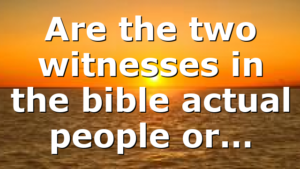 I have become increasingly bothered by Christian bumper stickers. Among the worst are: “In case of rapture this car will be unmanned,” “Do you follow Jesus THIS close?” and “The Bible said it, I believe it, that settles it.” What’s the point of these stickers? Slap on a sticker, save a sinner, is that the idea? More often then not, they are offensive, misleading, or theologically narrow.
I have become increasingly bothered by Christian bumper stickers. Among the worst are: “In case of rapture this car will be unmanned,” “Do you follow Jesus THIS close?” and “The Bible said it, I believe it, that settles it.” What’s the point of these stickers? Slap on a sticker, save a sinner, is that the idea? More often then not, they are offensive, misleading, or theologically narrow.
Even if the Bible says it, what exactly does it settle? What exactly does it say? As a woman, do I have to wear a hat when I pray? (1 Cor 11:5) The concept behind this phrase is bothersome on many levels. It speaks to the Bible simply as an authoritative rulebook, a manual, a set of mandates or commandments. There are many problems with that viewpoint. Take for example the book of Proverbs. It is not meant to be a book of mandates, yet many take it as such. Proverbs 13:24 is often spoken of as a biblical commandment to spank our children. To spank, or not to spank, isn’t the question here, rather, is this proverb meant to be a universal mandate, for all people, for all time? Is this meant to be a commandment at all?
What would happen if we regarded the entire book of Proverbs as commandments meant to be fulfilled literally by God’s people today? We would have to beat stupid people and children (10:13; 14:3; 18:6; 26:3), we must subject lazy people to forced labor (12:24), we must own many oxen if we want to have food to eat (14:4); we must cast lots in order to resolve disputes (18:8); and my favorite, we must commit suicide by slicing our throats if our appetites are too large (23:2). In other scriptures, we would have to gouge our eye or cut off our hand if it causes us to sin (Matthew 5:30).
With a “fact”-based perspective on the Bible and its authority, when Scripture comes into conflict either with itself, or with other “facts” in the world, the burden is to defend one interpretation of Scripture as verity, authors as authoritative, and teachings as certain, fixed or de-contextual. I have been challenged to ask myself, “What is the purpose and the function of the word of God, not so much, what are all the answers in the word of God.” Even now you may be hissing “heresy! Is there no absolute truth? Of course the Bible is the book of answers!?” The Bible is the Word of God, but I will be crippled as a minister and a person of faith if I spend my time in the Word of God trying to defend the “right” “facts” and “settling it” like the phrase on that bumper sticker, rather than discovering who God is, God’s purpose in the world, and who He made me to be.
Reading and applying Scriptures isn’t about cutting a clear “how-to” path to receiving the right answer from God. With this approach, and likely emphasis on the inerrency of Scripture, the historical and scientific “facts” must be 100% accurate, and the harmony and synchronism of every detail and account must fit together exactly. Problematically, if one “fact” should be questionable in any way, then the entire Bible and its authority comes crashing down.
Even the idea of “facts” in the Bible is problematic, for a fact itself is subject to change based on who is interpreting the fact, against what theory, through which linguistical insight, through which assumed historical context, and through what personal, contemporary lens.
Many presume that the key or a key thing about the Christian life is that it means having the answers to questions. The Bible is not a set of answers to every question, the Christian Life is not about having the right answers to life, rather living life as Christ-follower helps me live with the questions of life.
![]()



Comments